Doom: The Politics of Catastrophe
£10.10£12.30 (-18%)
‘Magisterial … Immensely readable’ Douglas Alexander, Financial Times
‘Insightful, productively provocative and downright brilliant’ New York Times
A compelling history of catastrophes and their consequences, from ‘the most brilliant British historian of his generation’ (The Times)
Disasters are inherently hard to predict. But when catastrophe strikes, we ought to be better prepared than the Romans were when Vesuvius erupted or medieval Italians when the Black Death struck. We have science on our side, after all. Yet the responses of many developed countries to a new pathogen from China were badly bungled. Why?
While populist rulers certainly performed poorly in the face of the pandemic, Niall Ferguson argues that more profound pathologies were at work – pathologies already visible in our responses to earlier disasters.
Drawing from multiple disciplines, including economics and network science, Doom: The Politics of Catastrophe offers not just a history but a general theory of disaster. As Ferguson shows, governments must learn to become less bureaucratic if we are to avoid the impending doom of irreversible decline.
‘Stimulating, thought-provoking … Readers will find much to relish’ Martin Bentham, Evening Standard
Read more
Additional information
| Publisher | Penguin (7 July 2022) |
|---|---|
| Language | English |
| Paperback | 512 pages |
| ISBN-10 | 0141995556 |
| ISBN-13 | 978-0141995557 |
| Dimensions | 21.6 x 13.8 x 3.06 cm |

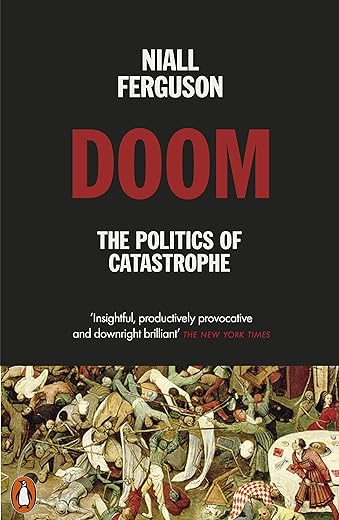
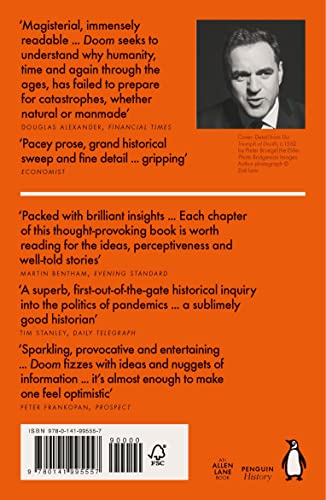
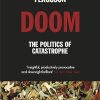
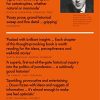


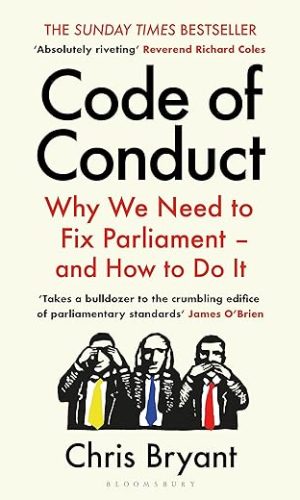




by Gabriel Stein
Another excellent and typical book by a brilliant author. Some of the chapters and comments on Covid now seem somewhat dated, but this was bound to happen. Overall, strongly recommended
by Ricky
Niall Ferguson is one of my favourite historians. He presents here a compelling and well-argued account of the many ‘doomsday’ scenarios that have visited humankind. He challenges the idea that some are purely natural catastrophes, such as volcanic eruptions, as some involve man-made disasters such as people building homes near these risky sites.
The incentive behind writing this book has doubtless been the Covid-19 epidemic and he sets out to put it into perspective, while mindful that it is not yet over…always a tricky task for an historian. Nevertheless, he uses the information we have to date to compare its likely trajectory to other pandemics as well as other ‘doom’ scenarios such as war and other atrocities.
The book is an intelligent take on a subject that usually requires a calmer consideration than is possible in current times. Whilst he does the historical account very well, the same cannot be said of him turning his considerable skills to the present. We live in very turbulent times, with propaganda masquerading as news, censorship instead of debate and moral proclamations producing hysterical and often non-rational judgements. It is simply impossible to produce a calm, measured and balanced conclusion about this pandemic, since there are many factual and counterfactual arguments and a dearth of agreed facts.
I recommend this book for its historical accuracy and attempt to present a measured perspective on the likely death toll. However, as he says himself, the breakdown of societal networks will have a much longer effect if and when the virus vanishes. We are living through anxious and dangerous times, since there are forces at work that seek to change the nature of Western society and possibly the world itself. This is where Niall Ferguson’s analysis breaks down in my opinion, since his bias starts to show through. He is clearly not a fan of the populist movement, nor President Trump. Yet, he fails to remain impartial and Fox News is mentioned several times as if propaganda is limited to their output. The elitists at Davos are shown as myopic in their quest for a Green economy, but the UN Agenda 21 and ‘The Great Reset’ project by the World Economic Forum escape similar scrutiny.
For his brave attempt to describe the historical Doom scenarios and compare them to the present day pandemic, I give this book 4 stars.
by Amazon Customer
The book discusses all kinds of catastrophes from pandemics like the plague, the Spanish flu and Covid19 to nuclear disasters like Chernobyl, the Challenger explosion, etc.. in light of the current pandemic interesting to see how catastrophes were handled through the ages.
by jpw
Very good. Gave a new perspective on how the world is endeavouring to manage Covid. Perhaps we will all learn to be ore prepared when the next pandemic arrives……
by Alexandra
Niall Ferguson’s new book exposes humanities obsession with calamity. Many believe that they are Cassandra, alone in their ability to predict the future while everyone else is too ignorant to listen to the plight. It is a cycle which never ceases to captivate the human mind. For some it boarders a fetish, “we were wrong today, but we’ll be right eventually”.
It is Ferguson’s triumph in this book that he does not fall in wholeheartedly with either the Covid Calamity Predictors or the Anti-Vaxx Loons.
Despite being released at the perfect time to be one, this is not a work exclusively about COVID-19 or pandemics (though they both unavoidably appear). Instead this is a work about catastrophes and the effects they have on our public/private spheres, and the scars they leave upon our mortal conscious.
We live in a time when the coronavirus pandemic is yet to pass. Thus any attempts to pen its course in a meaningful manner – which will stand the test of time – is futile, and (for now) a waste of effort. As Ferguson puts it: ‘To write a history of a disaster that is not yet over is, on the face of it, impossible’. It perhaps says something about our ‘next day delivery’ society that there is an immediate market for such a work. However she was bound to rear her head at some point and Corona struts onto the center stage as the star of this works finale. I comforted myself in the knowledge that at least someone of sense was cataloguing these events. I am thus reluctant to judge this book wholly, including its final chapters. On the surface it seems sensible and its verdicts sound. But there are many developments yet to come which none of us can foresee. Who am I to judge, for who am I to know?
by Janie D
Not an easy read, topic wise and prose wise. But interesting.
by David Ashforth
Niall Ferguson is brilliant in describing how politicians from classical days until now produce and impose policies which turn out to be disasters.
When he comes to consider what political policies might be tried in the future and how they would fare he abruptly drops his analysis of actual present or proposed policies and instead spends the last quarter of his book analysing the plots of futuristic novels as though they were reliable reports from the future.
The book describing how the interaction of present world political policies and popular movements might work out remains to be written.
by Susan
Have already recommended this to many of my friends who like me have wanted a comprehensive and reliable historical context for the Covid-19 pandemic.